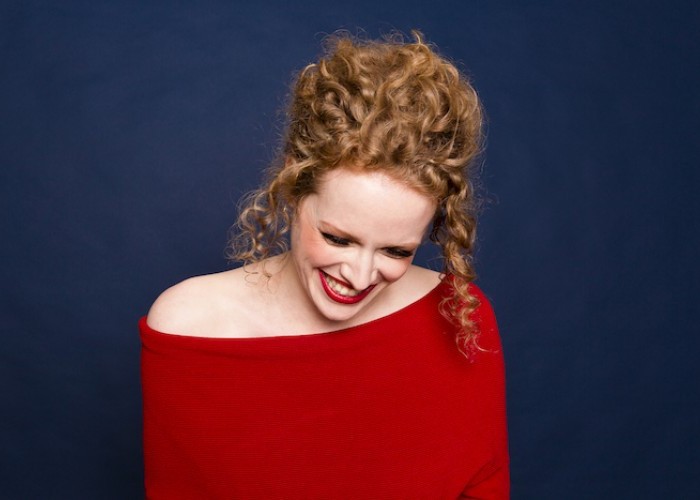Jan 13, 2026 2:09 PM
More Trump-Kennedy Center Cancellations
The fallout from the renaming of the John F. Kennedy Center for the Performing Arts to include President Donald…

Vocalist Kristen Lee Sergeant’s new album is titled Smolder.
(Photo: Jordan Frey)It’s no coincidence that Kristen Lee Sergeant sings several lyrics referencing wine on her sophomore release, Smolder (Plastic Sax). That’s because when Sergeant moved to New York in 2005 armed with a clear plan to pursue a career in musical theater, she paid the bills with, as she puts it, an “easy, low-stress” job in a wine store that “gave me space to focus on developing my voice.” Then, at the onset of an aesthetic journey that would proceed from opera to musical theater to cabaret to jazz, Sergeant took notes on bottles, immersed herself in oenological fundamentals and developed sufficient chops to land a sommelier gig at the popular restaurant Gotham Bar & Grill, before moving to The Grill, which the New York Times designated Restaurant of the Year in 2017.
“New York quickly tells you who you are, and I recalibrated,” Sergeant said over espresso at a Greenwich Village cafe, explaining her artistic shift to more intimate styles of performing. “I needed to know how to use a microphone, and really sing to people in the audience—the fourth wall had to go. I put a lot more on the line now than I did when I was ‘performing.’”
You can hear the truth of this self-description on Smolder, a concept album that opens with a vivid rendition of Spandau Ballet’s 1983 hit “True” and two original songs on the subject of troubled erotic love. Then Sergeant moves into well-wrought interpretations of seven songs culled from various corners of the jazz and musical theater canons that address the “smolder” metaphor from different angles. Throughout the proceedings, Sergeant interacts organically with a swinging rhythm section (Jeb Patton, piano; Cameron Brown, bass; Jay Sawyer, drums). And she coalesces her investigations into the disciplines of orchestration and arranging, expanding her palette to incorporate the instrumental voices of Jody Redhage Ferber on cello, and Ted Nash on alto flute and alto saxophone.
“If I like something, I want to dig in,” Sergeant said. “I want to know what makes it work.” She applied those imperatives when establishing a business model for Smolder, for which she incorporated herself, taking on investments, rather than angel donations. “It’s about taking ownership over myself as an artist and a business woman,” she said. “I’ve tried the model where someone else does it for you. It hasn’t worked. For me, to be creative is to be an entrepreneur. ‘Entrepreneur’ just means you want to make things.”
These days, Sergeant is making her own wine. In 2014, she and Jazz at Lincoln Center Orchestra stalwart Nash, with whom she recently began cohabiting, launched the Two Notes brand. “Ted had an idea to plant grapes, and I had wonderful connections through the wine industry that allowed us to connect with a like-minded winemaker,” she said.
Nash elaborated in a separate conversation. “This wine exemplifies how Kristen and I love to explore and express things that we are passionate about—as is music,” he said. He noted that Sergeant, born and raised in 390-year-old fishing village Manchester-on-the-Sea, Massachusetts, “loves Old World style, French wine,” whereas he, a Southern Californian, is “more New World—hit me over the head with a big, rich taste. Two Notes blends both worlds, to satisfy both of our tastes.”
Last August, with releases of Smolder and a second Two Notes vintage both impending, Sergeant left The Grill to devote more time, care and attention to creative endeavors. “I was working with the best in the business,” she said. “I tasted some of the greatest wines in the world. Some of these need to be cellared awhile because in youth they haven’t become cohesive. I feel that the wine industry helped me cellar myself for the music world.
“New York City is the home to nomads who don’t feel at home in the world, and jazz is the home for musical nomads. It has infinite possibilities. It demands you bring all of yourself musically to the fore, and then go further. I’ll never be settled, but being unsettled is what the art form of jazz demands.” DB

Belá Fleck during an interview with Fredrika Whitfield on CNN.
Jan 13, 2026 2:09 PM
The fallout from the renaming of the John F. Kennedy Center for the Performing Arts to include President Donald…

Peplowski first came to prominence in legacy swing bands, including the final iteration of the Benny Goodman Orchestra, before beginning a solo career in the late 1980s.
Feb 3, 2026 12:10 AM
Ken Peplowski, a clarinetist and tenor saxophonist who straddled the worlds of traditional and modern jazz, died Feb. 2…

The success of Oregon’s first album, 1971’s Music Of Another Present Era, allowed Towner to establish a solo career.
Jan 19, 2026 5:02 PM
Ralph Towner, a guitarist and composer who blended multiple genres, including jazz — and throughout them all remained…

Rico’s Anti-Microbial Instrument Swab
Jan 19, 2026 2:48 PM
With this year’s NAMM Show right around the corner, we can look forward to plenty of new and innovative instruments…

Richie Beirach was particularly renowned for his approach to chromatic harmony, which he used to improvise reharmonizations of originals and standards.
Jan 27, 2026 11:19 AM
Richie Beirach, a pianist and composer who channeled a knowledge of modern classical music into his jazz practice,…